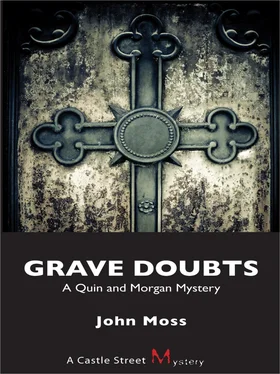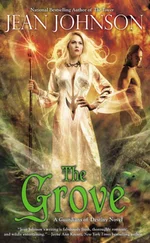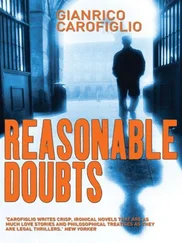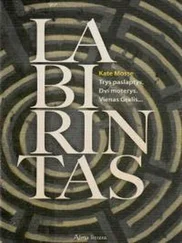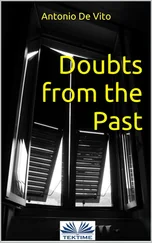John Moss - Grave doubts
Здесь есть возможность читать онлайн «John Moss - Grave doubts» весь текст электронной книги совершенно бесплатно (целиком полную версию без сокращений). В некоторых случаях можно слушать аудио, скачать через торрент в формате fb2 и присутствует краткое содержание. Жанр: Криминальный детектив, на английском языке. Описание произведения, (предисловие) а так же отзывы посетителей доступны на портале библиотеки ЛибКат.
- Название:Grave doubts
- Автор:
- Жанр:
- Год:неизвестен
- ISBN:нет данных
- Рейтинг книги:4 / 5. Голосов: 1
-
Избранное:Добавить в избранное
- Отзывы:
-
Ваша оценка:
- 80
- 1
- 2
- 3
- 4
- 5
Grave doubts: краткое содержание, описание и аннотация
Предлагаем к чтению аннотацию, описание, краткое содержание или предисловие (зависит от того, что написал сам автор книги «Grave doubts»). Если вы не нашли необходимую информацию о книге — напишите в комментариях, мы постараемся отыскать её.
Grave doubts — читать онлайн бесплатно полную книгу (весь текст) целиком
Ниже представлен текст книги, разбитый по страницам. Система сохранения места последней прочитанной страницы, позволяет с удобством читать онлайн бесплатно книгу «Grave doubts», без необходимости каждый раз заново искать на чём Вы остановились. Поставьте закладку, и сможете в любой момент перейти на страницу, на которой закончили чтение.
Интервал:
Закладка:
The thought of Marlene Dietrich in The Blue Angel, reducing her ridiculous admirer to ruin, and of Mildred in Somerset Maugham’s Of Human Bondage, how she led her lover into the depths of despair. These images skirted along the edge of his mind, drawing him into their company. Yet, he saw those doomed men as victims in scenarios crafted by misogynous men, while he had been the victim of his own emotional ambivalence.
He loved women. He wanted to be free, he wanted to be loved — but the two seemed incompatible. Mutually exclusive desires. Himself, alone, caught between.
He thought about Lucy as he turned off the 401 on the outskirts of Port Hope. She had drawn him inexorably into an abyss of anguish, and yet, strangely, he missed her in his life. No, what he missed was the intensity of his unhappiness; the way, like the pain of a phantom limb, she had reminded him of what wasn’t there.
Morgan clambered out of the car, admired the looming outlines of Alexander Pope’s house etched against the predawn sky, and made his way to the side door with its antique lock, which he managed to pick open in seconds. The house was huge inside — larger than he had expected from its outside dimensions — and rambling, despite the severe exterior. There were country antiques everywhere and he could not tell in the dull light of early morning which were original and which were what Alexander Pope described as “authentic reproductions.” Running his hands over a sideboard with raised panels, he thought he could feel something in the wood suggesting it was new, despite the layers of chipped and worn paint with oxblood showing through like wounds. It did not have the feel of old wood — it felt cool and dense. If it was a fake, though, it was, to his eye, brilliantly accomplished.
Lying everywhere against the walls and on top of tables and hutches were odds and ends of forged iron and articulated wood that spoke of pioneer life now as remote as the most ancient of times. He realized in a brief thought that he had no more access to his own heritage than the people on Rapa Nui had to theirs. Less, in fact, for although they might not fully understand their cultural legacy, they lived among its monuments, they replicated historical texts they could no longer read, and honoured the past in ways we have forgotten how to do.
He became annoyed with himself for dawdling; nothing would have pleased him more than to linger over each artifact and item of furniture, and to explore the interior spaces of the house itself. But working against that was a diffuse sense of urgency about Miranda’s well-being and a more immediate concern with being arrested for break-and-enter.
It was still too dark to see clearly, so Morgan decided to run the risk of turning on lights — which, of course illuminated the diverse colours of the painted furniture and made him yearn to examine each piece more closely. He forced himself to keep moving through what seemed like a vast wunderkammern, a live-in cabinet of curiosities. He found two studies, one on the main floor off the central hallway and one upstairs, adjoining the master bedroom. The downstairs study was an office and general workspace, with building plans and business files strewn casually about. The upstairs study was even more cluttered and much more personal. This was obviously Pope’s sanctum sanctorum, where only the most intimate of visitors would likely be admitted.
On display were private mementos, including clusters of photographs on a massive corkboard, numerous framed pictures and diplomas, souvenirs of extensive travel. Innumerable books littered the floor, obscuring the patterns of antique Persian carpets. As soon as Morgan entered the room, he felt he was being intrusive. That was what made him sure it was the best place to start his search. Whatever it was he was looking for, it was here.
He slumped down in a leather armchair and gazed around, taking inventory. The carpets overlapped with casual eloquence but the paintings on the walls were Renaissance reproductions. There were two works of Japanese calligraphy, done with the florid discipline of a master. The framed photographs were in pairs, the left ones of log and clapboard houses as crumbling derelicts and the right ones of the same houses rebuilt as showpieces, looking more authentic than they might have appeared to their original owners. He got up and walked about, circling, as he often did, registering everything, waiting for his gathering perceptions to give up a pattern, a revelation, something he could work with. Outside, the sky was taking on colour. The stars had faded with the promise of morning. Turning away from the window, Morgan scanned the constellations of photographs pinned to the corkboard.
Reflections on a familiar face caught his eye. Partially covered by several other pictures was a snapshot of Rachel Naismith in a country setting. He removed the picture from the board, expecting to see Miranda as well. It must have been taken when they were here in the spring. No, he thought, the background was the green of summer. They were here in March or early April. He held the picture into the light. It was a bit worn and faded. Rachel looked younger. Squinting, he recognized in the background a hill town in Tuscany, and the distinctive square towers of San Gimignano.
He scanned the other photographs on the board more carefully and found another of Rachel, this time rubbing the nose of the famous bronze boar in the Straw Market in Florence. Behind it there was a duplicate picture, only someone else was rubbing the bronze. He squinted. It was Shelagh Hubbard. Behind that was another, the same, only this time it showed Alexander Pope with the boar’s snout under curled fingers as if he were subduing a wild beast.
Methodically, Morgan began removing the photographs, which at some points were layered in clusters three and four deep. He was no longer concerned about leaving behind signs of his illicit search. He could feel his heart pounding and he had to consciously steady his hands. He lifted a framed photo from the wall and tilted it to the light.
Rachel had mentioned her interest in art as a student at Western. It was a long reach from London on the Ontario Thames to Florence on the Arno. But there she was, in a photograph lost among the pictures of reclaimed Ontario buildings, standing by the wall at riverside, with the Ponte Vecchio in the background looking more like a quaint architectural accident than a bridge. Her dark features were difficult to make out against the dazzling light of the Florentine sky. Beside her was a blond woman, Shelagh Hubbard, whose pale features were equally obscured by the brightness of the sun. It was an odd picture, and yet charming, with the ambiance of the city on full display.
As he expected, Morgan found a photograph with Rachel and Shelagh together. They were standing arm in arm like a couple of honeymooners in the Piazza del Duomo, posing near one of the Baptistery doors by Lorenzo Ghiberti, the “Gates of Paradise.” As myriad explanations swarmed through his mind, he could not help but respond to the beauty of the city that had brought this improbable threesome together. It must have been five or six years ago. Morgan had been there fifteen years before that. As personal memories surfaced, he suppressed them. This had to do with Miranda. How did she fit into the picture?
Rifling through the remaining photographs, Morgan found a Polaroid snap by a street photographer taken in front of the Palazzo Vecchio. Alexander Pope’s long arms were casually draped over each woman’s shoulders, drawing them close to his side. The intimacy of their embrace seemed to Morgan a public celebration that the three of them were lovers. In his mind, however, the images of four people, not three, wheeled in freefall as he struggled to assimilate their possible relationships.
Читать дальшеИнтервал:
Закладка:
Похожие книги на «Grave doubts»
Представляем Вашему вниманию похожие книги на «Grave doubts» списком для выбора. Мы отобрали схожую по названию и смыслу литературу в надежде предоставить читателям больше вариантов отыскать новые, интересные, ещё непрочитанные произведения.
Обсуждение, отзывы о книге «Grave doubts» и просто собственные мнения читателей. Оставьте ваши комментарии, напишите, что Вы думаете о произведении, его смысле или главных героях. Укажите что конкретно понравилось, а что нет, и почему Вы так считаете.
